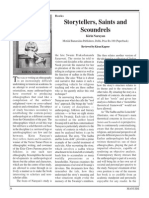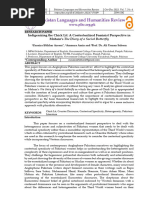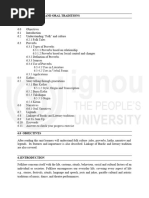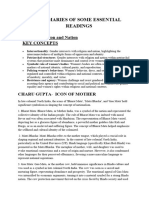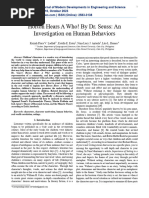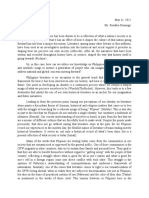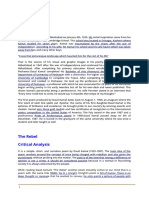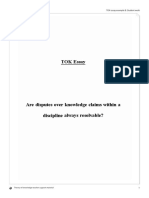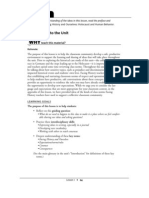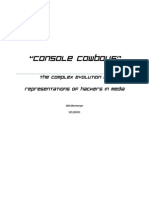Meatless Days
Meatless Days
Uploaded by
azmat.pti.ikCopyright:
Available Formats
Meatless Days
Meatless Days
Uploaded by
azmat.pti.ikOriginal Title
Copyright
Available Formats
Share this document
Did you find this document useful?
Is this content inappropriate?
Copyright:
Available Formats
Meatless Days
Meatless Days
Uploaded by
azmat.pti.ikCopyright:
Available Formats
See discussions, stats, and author profiles for this publication at: https://www.researchgate.
net/publication/317349130
Recreating History Through Language: Allegorical Significance of Suleri's
Meatless Days
Article · June 2017
CITATIONS READS
0 5,364
1 author:
Humaira Riaz
City University of Science and Information Technology
8 PUBLICATIONS 3 CITATIONS
SEE PROFILE
Some of the authors of this publication are also working on these related projects:
My current project is "Effects of Pandemic on Religion" for a book chapter edited by Darren M. Slade, PhD |Global Center for Religious Research (GCRR) | President &
CEO Socio-Historical Examination of Religion and Ministry (SHERM) | Founding Editor Rocky Mountain College of Art + Design (RMCAD) | Adjunct Professor of
Humanities The FaithX Project | Research Director USA. View project
All content following this page was uploaded by Humaira Riaz on 05 June 2017.
The user has requested enhancement of the downloaded file.
Abasyn Journal of Social Sciences – Special Issue: AIC 2016
Recreating History Through Language: Allegorical Significance of Suleri’s Meatless
Days
Humaira Riaz
Lecturer, Department of English City University of Science & Information Technology,
Peshawar Pakistan.
Abstract
The study investigates the allegorical significance of Sara Suleri’s Meatless days by
examining how her personal story entwines with the political history of Pakistan. Qualitative
analysis of the text views the use of language as a vehicle, which carries Suleri’s notion of
‘dislocation’ to the readers’ mind. As framework, it uses theory of ‘constructivism’ that
focuses on the capability of human to interpret meaning by correlating the ‘interaction
between their experiences and their ideas’ .Written within the context of the creation of
Pakistan, the memoir piles up intimate memories of the author’s personal as well as public
life narrating the tales of food, love, home and belonging. Anecdotes about Suleri’s family
and friends narrating the major turning points in the history of Pakistan are given life
through her unique play of language. The undercurrents of the author’s life are historical and
public events most significantly ‘independence’. Her use of language re- creates that history,
invoking the ‘lost’ through the tales of her mother, sister and friends. The study provides a
profound knowledge of the political history of Pakistan through a woman’s mind. It shows the
character development through inner experiences of their lives. It can be viewed a landmark
in the conscious raising of females in the subcontinent understanding their identity in the
South Asian cultural context. It concludes by foregrounding Suleri’s idea of displacement as
‘subtle’. The memoir reflects the change in perspectives through literature.
Keywords: Intersection, Dislocation, Personal, Political, Re-making, Suleri
Introduction
Meatless Days (1989) is a delicately shaped memoir representing life in postcolonial
Pakistan. Suleri interlinks the intensive historical facts of independence and her own personal
and most cherished memories depicting characters of her Welsh mother, her Pakistani father
who was a leading political journalist Z.A.Suleri, her five siblings and her grandmother Dadi.
She gives an account of her own passage to America.
Language shapes our thoughts. We speak the way we think and hence create knowledge
in order to construct the reality. Actually, this insight helps us in understanding the very
essence of human beings. Individual perceptions create reality. It involves the whole process
of cognition. Suleri, in Meatless Days, uses language to construct a world the way she
perceives, categorizes and gives meaning to it. It is an attempt to re-make the family history,
relationships, private and public events and significantly the historical facts after the creation
of Pakistan. Ideas and stories are personal. These exist in the heart and mind in the form of
energy ‘that science cannot fully explain’ (Dougherty, 2009). These are further transformed to
people through language; oral and written. There cease to be a single story then. ‘The
personal becomes political’ (hook, 1984) .Suleri depicted an entirely changed picture of her
family and public life. She writes as she sees but there are different ways of seeing (Roy,
2008). She shares her way of seeing with the readers. She re-writes the tale of nostalgia where
Universiti Teknologi Malaysia, Kuala Lumpur, Malaysia 59
Abasyn Journal of Social Sciences – Special Issue: AIC 2016
she hedges feminism. She is born when Pakistan is born. The undercurrent in her text is the
turmoil in her family parallel to the situation in the country. Both ways she addresses the
theme of dislocation. She is reworking it. She tries to find her place in the history. Her
language work is so powerful that the ‘access is denied’ to everyone’; readers have to develop
a political and social understanding of the context Suleri wrote in. She chooses food as a
fundamental nostalgic link for re-writing the theme of dislocation to smell original kitchens
and households of homeland. She also discusses her life in America but not in terms of
regionalism or racism. She looks at it from an outsider’s perspective. Sometimes she
untangles the facts successfully. Many a times it is hard to interpret her language.
Suleri writes Meatless Days in the context of the creation of Pakistan. Turmoil and
chaos is likely to run through the text. Her techniques of foregrounding and back grounding
history of Pakistan help the readers to interpret the details she reveals by using language
symbolically. Her stories are not actually stories of family relationships or mere history but
implicitly indicate her notions of displacement and gender. That does not project by any
means that she is an ‘ideologue’ (Roy, 2008). Undeniably, the language of her text portrays
various aspects of her life; personal and public. She highlights the relationship of both.
There is a fusion of political with personal in Meatless Days. Like Mark Twain, Suleri
does not intend to draw morals into her text. Instead, she wants the readers to interpret her
text as it appears. She narrates her tales with multiple meanings-the literal story perceptible in
the words and figurative story is constructed. Her text is context bound.
The above discussion leads the current study relies upon the philosophical standpoint on
‘the nature of knowledge’ termed ‘constructivism’ by Jean Piaget. Noah defines it as ‘an
epistemological stance’ (2013). Constructivism has many ‘flavors’ (Piaget 1967). The theory
focuses on the capability of human to interpret meaning by correlating the ‘interaction
between their experiences and their ideas’. Piaget views the relationship in connection with
the ‘genetic makeup’ of humans developing them ‘intellectually’. He focuses on the
‘development of human in relation to what is occurring with an individual as opposed to
development that is influenced by other humans’ (1967). Fundamentally, the study
investigates the recreation of history through language by correlating experience and ideas.
Genetically strong, Suleri’s personal experiences develop her intellectually into a
powerful woman. She records her personal experiences of study. She also re-counts home
environment, her mother, Mair’s marriage and her position in a Pakistani family, Suleri
foregrounds development of each character in the text. Particularly relating the story of
Mustakori, Suleri demonstrates that all these characters develop within their own personal
experiences of life instead of getting influence from other individuals. Her characters speak
and go through their individual experiences to construct the reality of their lives.
The current study discusses theory in relevance to text in detail.
A Saga of Memory
Meatless Days is a saga of memory, food, history and nostalgia for homeland. It is not a
seamless memory. She writes about ‘Excellent things’ in women, meatless days, friends,
siblings, her father and most dominantly dedicates a whole chapter to her mother. She
Universiti Teknologi Malaysia, Kuala Lumpur, Malaysia 60
Abasyn Journal of Social Sciences – Special Issue: AIC 2016
sketches a wonderful world through letters. She is the ‘change’ she wishes to see in her world.
Through language, she gives life to what she thinks. She constructs a world with the concept
of woman ‘not really a part of an available vocabulary’ (1, p.1). It reflects Suleri’s thought
and situation about women in Pakistan as she observed. Very few women in a conservative
patriarchal society dare to challenge its notions and transfer their thoughts to the canvas
inviting everyone to interpret in a scrupulous way. To call Suleri the flag holder of feminism
in Pakistan is far from being debatable. She absorbed and shared. She was not ‘too busy for
that’ (1, p.1). Her narratives serve as a mirror of the larger picture she wants to display.
Her memoir starts highlighting the position of women in the country she belongs. She
uses symbolic language yet literal meaning is also scattered through the pages to reveal the
proceedings as these are. The reader may question the credibility of Suleri’s account because
if we critically look at the history of post-colonial literature, we find that writing
autobiographies are dangerous to a certain extent. ‘How subjective structure can …give birth
to objective truth?’ (Spivak, 1999). Writing about the Muslim rituals of animal sacrifice, her
tone becomes bitter. She becomes queer on the subject of Islamic rituals ‘chopping up
animals for God’ (Suleri 1989 p.4). Being a native and Muslim, Suleri constructs a doubtful
vision about her religion that may raise speculation in the minds of the readers to question the
very doctrine of Islam and its believers Moreover, offering sacrifice to God is not a
fabrication. The Holy book reveals this fact to the followers of Islam explicitly in its second
chapter. Suleri’s use of word ‘chopping’(Suleri 1989) denotes the brutality of act whereas
Muslims observe it as a sacred religious practice to strengthen their belief. The choice of word
misrepresents the world of Islam involved in butchery of innocent animals. Dadi’s pining for
‘choppable things’ (Suleri 1989) is another example to intensify the previous description.
However, later, Suleri applauds the excitement and preparation for Ramadan. Dadi’s character
is the embodiment of a conventional woman who can be located in every second household of
Pakistan. Identities ‘are reconfigured’… ‘the moon had been sighted and the fast begun’
(Suleri 1989, p.30). The month of Ramadan reconfigures the identities. Month of Ramadan
holds significance in the history of Pakistan. Pakistan came in to being in the month of
Ramadan. Therefore, memories are closely associated to the month. Every year observes the
celebration of independence twice that enhances the value of liberty and freedom reminding
the great sacrifices Muslims offered for a new state. Suleri figures out the tragedies that lead
afterwards. Bhutto’s regime presents a mournful picture of the chaos Pakistan faces. His
regime is shaken, ‘Islam took to the streets’ (Suleri 1989, p.16). Suleri has recreated the
situation for the readers and deplores the frenzied and unpredictable condition since creation
of Pakistan. Suleri creates pathos by allegorically pointing to the sorrowful events in the
history of Pakistan. Sheweighs on people’s emotion swaying their opinions in different
directions. She refers to the burns of this land by illustrating the accident of Dadi and lrfan’s
burning. ‘Dadi’s burns were slowly learning how to heal’ (Suleri, 1989, p.14). Analogy is
created to foreground the contemporary situation of the country. Politically Bhutto’s regime
was peaceful and democracy was at the horizon. But Fall of Dhaka created noise as a stone
shatters the peace of the quite water. Dadi’s cotton garment (Suleri,1989, p.14) presents a
beautiful allegory for the burns of West Wing of Pakistan that took fire and she was found ‘a
little flaming ball’ (Suleri,1989,p.14). The ‘different plans’ of living through ‘her sojourn’ is
parallel with the sustainability of the country. The country endures the tragedy. Suleri’s
Universiti Teknologi Malaysia, Kuala Lumpur, Malaysia 61
Abasyn Journal of Social Sciences – Special Issue: AIC 2016
language is denotative of the anguish in the history which reveals and conceals such tragic
events from the human eyes. Her language is extremely critical when she narrates Dadi’s
forgetfulness of prayers ‘for God could now leave the home and soon would join the
government’ (Suleri,1989,p.15).She points out institutionalization of religion which proves
perilous. Reader’s mind, sense and logic are besieged y Suleri’s argument that religion must
be separate from politics. Unfortunately, in Pakistan religion is politicized. It is the institution
used to assert authority as well as patriarchy. ‘Taken to streets and vociferate[d]’ (Suleri,1989,
p.15), it compels people like Suleri’s father to pray and try ‘to converse life back into a
finished love’ (Suleri,1989).
Suleri’s theme is dislocation and through bathos and ethos, she depicts it in every
episode. Muslim nationhood, the foundation for Two Nation Theory is pushed back and
religion is dragged into the political houses. Meatles sDays is a remarking of history. Suleri
draws situational analogy from the kitchen where Dadi’s desire for tea at midnight entails the
burring accident.
Why does Suleri focus on food analogies? Food is a common need of all the human
beings. Words used for desire of food symbolize nostalgia; longing. Suleri talks about her
culture and food. She asserts the importance of understanding history and culture
foregrounding food as the basic component of culture. Reference to government ban on meat
for two days speaks itself of the irony of situation as the ban triggers up the desire for storage.
Living in the ‘expectation of threatening surprise’Suleri points at ‘the hidden trickeries in the
scheme of nourishment’ (Suleri,1989, p.28) when commodities are missing from the markets
most of the time. Suleri satirizes the government responsible for this saturation. As a common
discourse, commodities such as flour, butter and tea suddenly disappear from the market and
after a while these are returned in ‘dubiously shiny attire’ (Suleri, 1989, p.29). Prices are
much hiked and the common person can ‘barely stand to look at them’ (Suleri, 1989, p.29). It
is her logical application of evidence that Suleri appeals to the reader’s sense or logic. Reader
being a consumer is aware of economic crisis and hence absorbs the factual accounts given by
the author. The text speaks of the pollution in food items. Suleri creates an image of pollution
in food compelling these items to ‘defy’ in a manner ‘of extreme belligerence’ (Suleri, 1989,
p.29). The undercurrent of these lines is that suppression coerces common people to revolt
and raise their voices that can lead the county to another civil war. Tactfully Suleri shifts her
argument from personal to national. Pakistani nation has internationalized its condition. The
paradox is they are unable to see the flaws. ‘Self – recovery’ (hook, 1984) is possible only if
one is able to see and describe one’s own reality. Suleri has made the personal political’
(hook, 1984) giving voice to her personal experience. She has determined the situation of her
family as well as of country. Not an ‘ideologue’ (Roy, 2008) Suleri draws parallels between
her family life and public life. She does this by highlighting the role of food to maintain the
intimacy through taste buds. She presents a profound picture by evolving the dynasty of cooks
referring to it as in the Allah Ditta era’… ‘in the Qayuum days’ (Suleri,19891, p.34) and their
off springs. Through the tale of Allah Ditta She implicitly deplores the regime of General Zia-
ul-Haq in Pakistan. ‘we were always waiting for Allah Ditta to die’ (Suleri,1989,p.34).The
past decade has seen that regime of Zia pushed people of Pakistan in a great disorder and they
literally wanted to get rid of his dictatorship. Allah Ditta ‘was a good cook and mean man
who announced the imminence of his death for years’ yet he survived long. This text connotes
Universiti Teknologi Malaysia, Kuala Lumpur, Malaysia 62
Abasyn Journal of Social Sciences – Special Issue: AIC 2016
a reference to the announcement of poles and democracy denied to nation for years. Suleri’s
ethos depicts the disappointment and hopelessness of the situation of Zia regime to make her
narrative credible. Although a good practicing Muslim, his policies led the nation on a blind
route. Iffat’s pregnancy draws another analogy of misery that Pakistani nation suffered. Suleri
questions the vulnerability of nation by posing a question if they know the pain of being
constantly kicked by something and realizing ‘[they] can never kick it back’ (Suleri, 1989,
p.35). Hence she merges the personal with public to construct the situation.
Living in Diaspora, Suleri writes about food, memory and longing. Her text is a reflection of
it. Its allegorical signification finds roots in the themes of nostalgia and displacement. Suleri
tracks down her childhood memory spentin Pakistan. Living in America, she longs for the
taste of her traditional food that links her with her people and land. Diasporas always trailed
of collective memory about another place and time and created new maps of desire and of
attachment (Appadurai et.al.1989).
The context of Meatless Days is the new born state and unrest in her family. The dying
experiences of Dadi, Iffat and her mother speak of the anxiety that her family feels. She calls
the condition in Pakistan ‘synonymous with grief’ (Suleri, 1989, p.19). History never lends us
comfort. We cannot get rid of our past because history records it. Episode of Iffat’s death
shows the intersection of person with political. Words of Shahid are further reassured by into
a more confirmed ‘loss’ (Suleri, 1989, p.19).
Suleri’s depiction of Pakistani society and its habitual norms sounds true as this nation
forgets tragedies effortlessly. Bhutto, Iffat and Mamma become ‘archaisms, quaintness on our
lips’ (Suleri, 1989, p.19). Writers have a future respective. Suleri’s world is today’s Pakistan
where nothing is changed. Tragedy after tragedy occurs and diminishes from our memory.
Thanks to history that keeps the sores alive. We have to keep stories alive. Like Leslie Silko,
Suleri follows a non-linear structure to narrate her stories (1979). Her words contain a story of
their own. Each individual character develops by experience life tragedies A great deal of her
narrative is inside the reader. Stories depict genealogy and belief. Art of narration helps in
creating the history for coming generation. Suleri’s life is marked by independence ‘the trying
times’ (1947, 1961& 1971) both personal and public. She is re-writing the past and therefore,
it gets complicated sometimes. Her sister Iffat and her mother die in an accident shattering her
life. Images of flesh and meat prevails upon text; the goat (Suleri, 1989, p.5), Dadi’s burnt
body (Suleri, 1989, p.14) Iffat and Mama’s death (Suleri, 1989, p.19) signify the need and
yearning for the physical presence that is lost.
The strange dream about her mother (Suleri, 1989, p.44) symbolizes her urge of unity
with her mother. Vision of swallowing flesh of her mother’s body brings a comparison to
Eucharist, the Catholic notion of unity by drinking the wine and eating wafer in the memory
of the blood spilled by Jesus Christ to save humanity. The dream implies her desire to be
one with her mother. The whole narrative constructs a correlation between the idea to be one
with her mother and individual experiences (Paiget, 1967).
The world depicted in Meatless Days hedges feminism. Strong powerful expressions
tend to make the ‘personal political’ (hook, 1984). Suleri internalizes the strong patriarchal
system in Pakistan and discusses it in her own family context. She views her mother who is
Welsh, dislocated from her homeland and creates her identity through her language. Her
mother’s life denotes a submissive stereotypical woman of Pakistani society. Her story
Universiti Teknologi Malaysia, Kuala Lumpur, Malaysia 63
Abasyn Journal of Social Sciences – Special Issue: AIC 2016
functions as ‘a maker of … identity’ (Silko, 1979). Suleri defines her character correlating her
experiences and notions of identity.
The way Silko moves from the idea of one’s identity as a tribe (1979), Suleri moves
towards creating a national identity. It holds records of relationships in an extended family
system as well as position of women in Pakistan.
Meatless Days is an attempt to voice the voiceless. The text starts with a feminist stance
but it moves on losing and recovering during the entire course. Finally, the feminist voice
becomes dominant in ‘What Mamma Knew’. For Suleri everyone is lost. ‘My audience is
lost’ (Suleri, 1989.p, 2), ‘We are lost’ (Suleri, 1989.p, 19). The word ‘lost’ signifies her
perception of displacement. She confesses missing ‘the absence of women’ [Suleri, 1989,
p.19] and grows ‘nostalgic for a world where the modulations of age are as recognized and
welcomed as the shifts from season into season’ (Suleri, 1989.p, 19). Much of her time is
‘lost’ (Suleri, 1989.p, 19) in explaining to her students at her university that ‘there are no
women in the third world’ (Suleri, 1989.p, 20). A woman in the third world is a daughter, a
wife, a sister or a mother. She is known by the relationships. She has no other identity. When
Suleri wrote this memoir, it was a time when women were deprived of their position in
Pakistan. The passing time has brought a consciousness to the woman of Asian region.
Writers like Suleri are no doubt the flag holders to talk about the gender issues in the context
of their patriarchal culture.
An expatriate, Suleri defines the inadequacy and alienation that she feels and observes
in the situation of her mother. She addresses the theme of feminism but there is no projection
of a ‘ ruthless snatching of woman’s identity, name, home, social status, right of personal
decision, and even children who are derivatives from her body’(Najma et.al 2012). There is a
craving for identity in Meatless Days. The language of Suleri’s memoir depicts her identity as
an Individual of elite class. If we contextualize her position, she belongs to elite class. To talk
about politics was a luxury of elite class in the era she wrote this memoir. It was not
everyone’s cup of tea in Pakistan. She could talk about politics, dictatorship and the details of
1971 war. If we draw a parallel between her character and her mother, we find dislocation
configures both the identities. Her mother dislocated of Wales internalizes the South Asian
patriarchy. Rather she ‘bargains with patriarchy’ in order to keep peace and harmony in her
household (Kandiyoti, 1988). Her fondness for Emma depicts her nostalgia for her culture that
she leaves behind. She may view Emma in her daughters or herself. Her father depicts a
‘patriarch’ depriving ‘his wife of her name and identity’ (Najma et.al 2012). The relationship
of Z.A Suleri is not at all symbolic of sheer domination in the text, yet in contrast to Mair
Jones’ character he appears to some extent the supporter of patriarchal notions. It is due to her
marriage that Mair Jones leaves her homeland and embraces a foreign culture. She learns to
submit and subdue. She is surrounded by the powerful discourse of her husband (Suleri,1989.
p,157).She adopts the habit of ‘looking down’ and ‘gravely listening’ (Suleri,1989.p,157).
Suleri Describes her parents ‘rhetorically so different’ (Suleri, 1989.p, 157) ‘always startling
each other with the difference of their speech’ (Suleri, 19891.p, 157). It shows her father gave
his wife freedom of speech. Suleri emphasizes ‘loss’ that gives her concept of dislocation
(Suleri, 1989). Mair, her mother, lost so much because of this marriage. New world, new
culture and new identify. She loses the status of woman and assimilates the role of a mother
and submissive wife ‘bargaining’ (Kandyioti, 1988) with patriarchy to survive in the extended
Universiti Teknologi Malaysia, Kuala Lumpur, Malaysia 64
Abasyn Journal of Social Sciences – Special Issue: AIC 2016
family system. Dadi’s role as assertive lady is another reference to the bargain Kandyoti
argued about (1988). The elderly woman in an extended household asserts her position to the
children and daughter-in-law. Suleri’s mother is difficult to be deciphere[d] (Suleri,
1989.p.166) for the reason that she is not ‘distracted’ (Suleri, 1989.p.166) from one thing or in
the direction of ‘other’. In addition, Mair Jones takes up her new identify which the new
culture has given her [Suleri, 1989]. She accepts the patriarchal design as a ‘process of
cultural assimilation’ (Bhabha, 1989). She learns to change ‘Why’ into ‘Let things be’ (Suleri,
1989, p.167). Her tale of dislocation does not lead to open resistance. She is living in exile ‘a
jealous state’ (Said, 2000). She has ‘very little to possess… what (she) achieve[s] in exile is
precisely what [she has] no wish to share’ (Said, 2000). In other words, she does not take
anything for granted. She focuses more on ‘what is actually here and now’ (Said 2000) rather
than ‘what has been left behind’ (Said, 2000). Her dislocation makes her ‘marginalized entity’
(Said, 2000); ‘her repudiation of race gave her a disembodied Englishness that was perhaps
more threatening’ (Suleri, 1989.p.163).
We can well understand Suleri’s text by beginning to ‘think of the process of reading
and remembering the text of a life in terms of reading a recipe of the self’ (Warley1992). It is
true that Suleri’s ‘recipe of the self’ (Warley, 1992) is rich in ingredients; her memories of
childhood, student life, life with parents, Dadi, sisters and sisters’ children. She talks about
the cooks and servants of the house in a preoccupied way that her identity. Like Kamila
Shamsie (Salt &Saffron 2004), Suleri’s dominant metaphor is food. She reveals her idea of
dislocation embedded in the childhood memories and recollection of the history of Pakistan
and descriptions of the intimate relationships. Albeit her language often gets bitter particularly
when she talks about women as she herself suffers the anxiety of being an outsider and other
in America.
Dislocation is the ‘flavor’ that Suleri brings forward to construct identity of characters
and the development during the course of action (Paiget, 1979). Bharti Mukerji and Jhumpa
Lahiri view the problems of dislocation faced by immigrants in United States or the western
world. They depict the ‘rootlessness’ and adaptability to the new environment marked by
anxiety and alienation. Suleri highlights her anxiety by depicting the memories of her
homeland. Her ‘inner alienation’ (Riaz&Babaee2015) shapes an identity grounded in diverse
experience of tales of ‘endurance and overcoming’ (Boehmer1995). Expatriate writer Monica
Ali encounters the theme of dislocation by frequent descriptions of places. Unlike her Suleri
and Shamsie finds solace in constructing food correlations. Suleri reference to era of cooks is
comparable to Shamsie’s ‘Tamarind sound[ing] like Taimur Hind (Salt of Saffron 2004).
Ruzy Suliza Hashim points out the distinct notion of homeland presented by female writes.
Their memories depict a strong nostalgia for homeland (2009). Readers interpret the text in
the milieu of all these relevant situations.
Mukhergee (1988) represented term ‘dislocation’ not as a failure but an expansion of
culture and aesthetic experiences of those dispersed. Suleri provides a unique perspective and
piquant examination of Pakistani culture from a native point of view. Her rigorous words
raise the voiceless as she relentlessly pursues personal and political tensions. For Salman
Rushdie hybrid identities arise from cross culture migration. Suleri’s notion of identity arises
from patriarchy as well as migration. Like Ibsen’s A Doll’s House before everything else she
is ‘a wife and a mother’. Suleri’s culture also defines woman with relationships.
Universiti Teknologi Malaysia, Kuala Lumpur, Malaysia 65
Abasyn Journal of Social Sciences – Special Issue: AIC 2016
Independence in 1947 is a century long struggle. It signifies the dawning of a new age. Its
contemporary political situation is replete with turmoil and so is the private family life of
Suleri. People in Pakistan with a strong belief wait for the ‘trying times’ to over. Suleri draws
remarkable parallels to show the depth of her grief. Her sister Iffat’s accidental death is
parallel to the tragedy of Fall of Dhaka in 1971.’Grave autumn colors to those days’ (Suleri,
1989, p.67). Use of language enhances the bewilderment of Pakistani nation on this great
tragedy. It is hard for them ‘to determine who the cause was and who the effect of that
somewhat sorrowful parting’ (Suleri, 1989.p.67). For Suleri ‘pains’ never subside. These have
their own unique form such as David pain, iffat pain...For her ‘Iffat still felt unburied…still
was warm, (Suleri, 1989.p.67). Suleri’s notion of dislocation is grounded in nostalgia and
memories of homeland; yet there is a vibrant and diverse view of not putting back ‘her body
where (her) life belongs’ (Suleri, 1989.p.67). She is contended and joyous ‘to let life and body
go grazing off to their own sweet pastures (.Suleri, 1989. p.68).
Like Ibsen’s Nora Suleri does not believe that any longer. She believed that before
everything else [she is] a human being (A Doll’s House). Suleri’s bitter tone defines the status
of females in Pakistan by relating tales of her mother and sister Iffat… ‘one makes the bed,
the other lies in it, and so are one’s household duties appointed’ (Suleri,1989. p.68).
Completion of her graduate studies compels her to ‘stave off marriage’ and ‘keeping it at bay’
(p.58), she gets admission in the university. Marriage although a sacred institute, puts strong
cultural barriers around females in South Asia. Elite class women afforded taking refuge in
studies during the past decades in Pakistan. For the common women, education at a university
was a luxury at the time when Suleri wrote her memoir. She talks about the sacrifice of
Pakistani woman who mutates under various language situations specifically in the name of
marriage through the character of Iffat. Iffat devotes ‘energies’ to Pakistan by learning to
speak Panjabi after her marriage and ‘then graduate[s] to the Jehlum dialect, spoken in the
region form where Javed’s family came’ (Suleri, 1989, p.141). In Asian norms, normally
woman changes her identity after marriage. Through Iffat’s husband family, Suleri figures out
the violence committed in the name of religion, honor and culture. In most cases the victims
are the poor females. The traditional goat sacrifice on the spot where Javed’s great
grandfather had slain his infant daughter is a demonstration to stick to tribal conventions. One
can never evaluate ‘… so aggrieved was he to have a female as a child’ (Suleri, 1989. p, 141-
2). This description is Suleri’s attempt to point out the ancient Arab tradition of burying a
female infant. Islam clearly denounces it. The holy prophet (SAW) proclaimed a girl child, as
is a symbol of pride and blessing form Allah Almighty. The holy Quran says ‘On the Day of
Judgment when the infant girl buried alive is asked, for what crime she was killed’. (Quran,
81:89). Suleri recreates the cruel tradition that in spite of religious sayings is still alive.
Ironically, Pakistan came into being in the name of Islam, a religion that ensures legal rights
to men and women. Suleri questions the culture and its unjustified norms. Bhabha (1988) uses
the term ‘rethink [ing] for something repeated in the name of tradition; it is not the sign of
being faithful to the history. Rather it shows revival of representing authority. In Meatless
Days Suleri is ‘Rethink [ing] the situation of her county, culture and her family. She
represents the authority that natives depict by describing their culture. Iffat’s daring venture of
elopement and marriage to Javed against the will of her parents earns exile and her father
never welcomes her. In Suleri’s culture, rebellion to norms pushes the individual to isolation.
Universiti Teknologi Malaysia, Kuala Lumpur, Malaysia 66
Abasyn Journal of Social Sciences – Special Issue: AIC 2016
In such a world ‘a woman can’t come home’ (Suleri, 1989, p.147). Suleri also questions the
reproduction rights of women in Asian culture. She depicts the gender supremacy of her
society by talking about her ‘mother’s laborious production of her five… sisters’ (Suleri,
1989, p.148) of ‘their seven’ (Suleri, 1989, p.148). Talking about women, her language has a
swing and flow that adds flavor of interpretation to the readers.
Suleri defies hypocrisy of the mourners and stages some ‘half sisterly fights for the
benefit of the visitors’ (Suleri, 1989. p.149). This depicts the inquisitiveness and interference
of the people whose purpose to visit the bereaved family is to enjoy the situation. Suleri is
critical of her mother’s submissive attitude. She represents nineteenth century image of
‘locked woman’. The difference is that she bears both joy and shame. She is also a
representation of ‘a caged woman’ (Binns, 1997). She is dislocated from her homeland. She is
a completely transformed woman. Her role as a teacher strengthens her character. Both
mother and daughter are ‘border crosser’ (Yancovitz, 1997). Like Spivak, Suleri points out
the Diaspora identify of women represented in a single woman (Yancovitz, 1997). Suleri
dedicates a whole chapter to her mother ‘What Mamma knows’. She describes her mother’s
face like ‘the binding of a book… knowing better than openly to announce its title (Suleri,
1989. p.151). She is the epithet of a perfect mother. A dislocated woman, Mair Jones teaches
her children perfect manners. She has assimilated the identity of a typical eastern mother,
striving to fulfill the children’s needs. Being a university lectures, her character is the
reconstruction of Anarkali, a dancing girl that the Mughal emperor Jahangir loved and she
was ‘bricked alive into her grave as punishment for having solicited a prince’s love’
(Suleri,1989, p.153). Mair also left Wales for Z.A Suleri and embraced a life within walls like
a Pakistani woman where she met compromises at every step for ‘having solicited [Z.A
Suleri’s] love’ (Suleri, 1989. p.153). Suleri finds an unpredictable ‘gravity… weightless ness
[her mother] carried with her (Suleri, 1989. p.154). It was only after Suleri adopted career
(teaching) that revealed to her the ‘sobriety’ (Suleri, 1989. p.154) of her mother whose ‘step
was always measuring out what she [saw]’ (Suleri, 1989. p.154). Incarcerated, her mother’s
movement was in ‘observation’ to a degree that held Suleri’s breath (Suleri, 1989. p.154).
These notions of feminism underline the theme of Meatless Days. It also denotes how
individuals develop through what their inner experiences are.
Images of feminism, dislocation and memory are constructed using metaphors and
figurative language abundantly. A synthesized meaning is constructed through analogies
because language as an abstract concept is constructed in the minds of readers. Suleri has
absorbed the external world; public and private. She tried to create ‘a new kind of historical
writing, whereby [she] give[s] no introductions whatsoever. [She]I use [s] the names, the
places, but [she]I won’t stop to describe them’ (Suleri,1990). Comparable to Slaman Rushdie,
she weaves her private life history into the public affairs of Pakistan. Her inner life
experiences develop the political history of Pakistan. She thinks that ‘these two entities are
inextricably connected to each other’. One’s private life is affected by public life and vice
versa. Her mother ‘now… has no secrets’ (Suleri, 1989, p.156). Dislocation has taught her ‘to
live increasingly outside the limit of her body’ (Suleri, 1989, p.156). For her the household
and ‘all the duties it implied’ gave contentment. She is the most ‘reticent woman’ in contrast
to Mr. Suleri the most demanding man (Suleri,1989, p. 157).Suleri creates a world of
chauvinism where her father’s ‘mode of fearsome inquiry’ was married to ‘Mamma’s
Universiti Teknologi Malaysia, Kuala Lumpur, Malaysia 67
Abasyn Journal of Social Sciences – Special Issue: AIC 2016
expression of secret thought’ (Suleri,1989,p.157). Still there is dignity in that incongruous
union (Suleri,1989, p.156) and her mother has learnt to follow the principles of compromise
for the sake of man to whom she yields and submits. ‘Enduring’ Mr. Suleri is her greatest
triumph. She guards her husband’s ego and pride and finds solace in describing the greatness
achieved during the struggle of Pakistan. It also denotes that home is where heart is. Miles
away from Wales, Mair Jones is contended with her children. Her contentment lies in
dislocation. Indirectly Suleri expresses her notion of displacement. Her relationship with
husband is a stereotypical husband- wife relation in the patriarchal society of Pakistan where
wife consoles husband at every step of life and thereby saves his honor. She has lost her
identity and her name. She has completely transfigured into an eastern stereotypical woman
‘naming Ranjha so many times that she has become his name…he has become him by herself
(Suleri, 1989, p.162). Suleri recreates the famous romantic folklore Heer Ranjha. She
questions the identity of woman who loses herself for the sake of man. Whether Heer or Mair
both lose their identities and reconstruct their ‘selves’. Mair Jones is transformed into Surryya
Suleri ‘… she had to re-distribute herself through several new syllables, realigning her sense
of locality’ (Suleri, 1989, p.163). Suleri highlights the position of woman in this region fixed
for decades. Married to a Pakistani, she surrenders her actual identity and is ready to ‘assume
the burden of empire… to let her [husband] colonize her body and her name (Suleri, 1989. p.
163). Suleri artistically brings the theme of colonization appealing to the sense of the readers
through bathos and ethos. She defines the disposition of her father as a colonizer whose
‘desire for [Mair] was quickened with empire’s ghost’. It tells the tale of suppression. Mr.
Suleri’s wish ‘to possess was a clear index of how he was still possessed’ (Suleri, 1989,
p.163). The ghost of colonization influences the people once subjected to it. Probably Mair’s
bargain is the discovery of ‘an ancient landscape’ (Suleri, 1989, p.163). She faces barriers of
culture, religion and language. Suleri depicts through metaphorical language a world where
her mother enters to explore and finds ‘a living place’ (Suleri, 1989, p.163). Dislocation gives
her new insight to break the barriers and find out new avenues of life. She adapts a careful
disposition of ‘someone who did not wish to be breaking rules’. She reconciles with her
present situation. For her survival, she succumbs to the new culture and land.
Suleri’s notion of feminism, memory and dislocation find another perspective
represented through the character of Mustakori. She is yet another interpretation of immigrant
characters. ‘her very route from East Africa to Ireland to Lahore’ maps her identity (Cook,
1997). In Pakistan, she meets a dislike for her scripted role as a ‘brown European’ (Suleri,
1989, p.49). For her ‘returning is somehow sweeter, less dangerous, than seeking out some
novel history’ (Suleri, 1989, p.49). Suleri’s perception of dislocation is thus less dangerous.
Except her father, all other characters find solace by reconciling to their situations. Her father
felt as a ‘minority’ (Suleri, 19891, p.119). Return ensures relief instead of wandering around.
Mair Jones and Mustokori learn to live a life of assimilation through performance;
performance at home and in theater. It entails the argument if identity and role can be easily
chosen and adopted. If it is optional then dislocation will never be the undercurrent of anxiety.
It means Suleri advocates speech and thought are ‘gold’, body ‘interiorize nothing by virtue
of biology’ (Cook, 1997). It also invokes the thought if internal body has no significance; if
that is so it is only the mind that has the superiority. The mind decides to change the identity
and so is done. In reality these questions are not as simple as these appear to be. Living a life
Universiti Teknologi Malaysia, Kuala Lumpur, Malaysia 68
Abasyn Journal of Social Sciences – Special Issue: AIC 2016
of assimilation could be the option for survival but not a voluntary choice ‘somewhat sweeter’
(Suleri, 1989, p.49) but ‘disappointed’. Mustakori does not let herself ‘understand the
principle of double occupancy’ (Suleri, 1989. p.49-50). Her identity has been deconstructed
many a times since her childhood. Her personality is an amalgam of multiple identities. Her
schooling in English boarding deprives her of her African identity and wrings ‘the Swahili out
of her inside’ (Suleri, 1989. p.52). The image of her growing up as a’ solitary mountain’ out
of ‘East African terrain’ (Suleri, 1989.p.52) implies Suleri’s concept of dislocation and the
colonization of English around the worlds. Mustakori urges to ‘grope for the shadow of a
perfect mountain’ (Suleri, 1989. p.52). ‘All she could find of her voice was its fault’ (Suleri,
1989. p.52). The language symbolizes the people cut from their roots develop hybrid
personalities. The rhetoric of hybridity emerged as result of postcolonial discourse. With a
‘D-status British passport’, Mustakori travels around clearly depict the restlessness in her
personality (Suleri, 1989. p.53). Her dislike for the ‘most colonial school’ in Kenya indicates
her rebellion against English domination. The family earning in Ireland by the brand name
‘Curry in Hurry’ made public by Mustakori embarrasses Suleri. It foregrounds Suleri’s elite
attitude towards language use. Dislocation makes Mustakori bold because she learns to yield
to circumstances where Suleri’s conscious is marked by colonization bestowing upon her
‘ambivalence’ (Bhabha, 1990). Mustakori struggles to understand the geography of Lahore
that puzzles her. She finds the ‘city’s habit’ to behave ‘like a mirage… its ability to disappear’
(Suleri, 1989. p.54). Her situation parallels Lahore and one always anticipates ‘to find Lahore
without quite locating it’ (Suleri, 1989. p.54). Various places earn her different names- Congo
lise, Faze Mackaw, Fancy Musgrave. She has drifting interests which are hindrances in
determining her identity.
People around Mustakori and Mair Jones do not take pain to understand their situations and
feelings. Their identities construct through inner conflicts of their lives. Suleri displays
beautiful image to describe the idea of dislocation by calling it ‘an aura of anticipation’
(ps.54). Mustakori and Mair Jones settlement relates to Lahore ‘that has built itself upon the
structural disappointment’ at the heart ‘of pomp and show and circumstance’ (Suleri, 1989.
p.54). The ‘structural disappointment’ is a reference to the city’s situation after 1947 showing
it as ‘an edifice of crude modernity’ (Suleri, 1989. p.54).
Another strong metaphor used for dislocation is ‘moon’ in the text. Suleri refers to Ramadan
as a ‘lunar thing’ coming always with ‘an aura of slight and pleasing dislocation’ (Suleri,
1989. p.29). It refers to the religious history of Muslims and indicates the ‘slight’ pleasure
Suleri takes in displacement.
The contemporary situation of the newborn country throughout her narrative
disappoints Suleri. She points at the immigrants’ struggle with language to find ‘vocabulary to
do justice’ to it. Using words for Pakistan’s geography as ‘subtle and slim’ in contrast to
Indian vocabulary calling it ‘as mean and skinny’ display her affection for the country. She
has developed an ‘individualistic mode of communication’ (Neoenglish 2010) to assert her
authority. Her concept of dislocation is equally ‘subtle’ (Suleri, 1989.p.55). Illustrating the
political scenario of Pakistan, the question ‘What next?’ disturbs her mind. Her feelings of
committing disloyalty by playing the death scene in the Caravan (Suleri, 1989. p.61) suggest
her sensitivity for the historical national tragedies after its creation ‘she had witnessed three
years ago, in the winter of the 1971 war’ (Suleri, 1989. p.61). She refers to the day of ‘cease
Universiti Teknologi Malaysia, Kuala Lumpur, Malaysia 69
Abasyn Journal of Social Sciences – Special Issue: AIC 2016
fire’ as’ trying times’ when her friend’s brother is killed an hour before ceasefire. She refuses
to plagiarize her own ‘experience’ (Suleri, 1989. p.61-2). For Mustakori, acting is ‘always
drawn from life’ replicating accidents (Suleri, 1989.p.61). Suleri calls it plagiarism and
plagiarism is disregarded as it deprives others from their due credit. The paradox here is that
Suleri herself is replicating her nation’s history by making it parallel to her family life story.
Or she denounces it in the form of acting and performance. She performs an O’ Neil death
scene in ‘unconscious imitation’ three years later; yet she wishes to give that ‘spectacle better
respect’ (Suleri, 1989. p.62). She sounds Aristotle concept of tragedy that invokes catharsis or
pleasure in audience. Suleri’s language sways her reader’s opinion, backward and forward.
Her language is persuasive to the extent to invoke contrary thoughts in readers’ mind. Her
diction depicts the use of language for specific purpose.
Sometimes logical fallacies in her arguments serve her purpose of persuasion to the
extent that reader agrees with her point of view. Many a times there is a hasty generalization;
an example of logical fallacies. She reaches a conclusion. For example, she calls mourning
simply a procedure to ‘prolong a posture of astonishment ‘(Suleri, 1989. p.172). It may not be
true for the situation of all mourners.
With the help of post-colonial rhetoric, Suleri discusses her mother’s relation to
Pakistan. An immigrant in America, she feels the’ unloveliness of New Havens’ (Suleri,
1989. p.132). Her observation of the people ‘shoveling hateful snow’ suggests the coldness of
temperature and her mood as well. Asked by her friend Jonathan to write Iffat’s death story
makes her hostile, as it is the bitterest part of her life. Iffat’s memories are source of
turbulence in her mind. Her characterization of her mother ‘a woman so disinterested’ whose
actual identity is transfigured and a ‘new’ emerges because of social and cultural
displacement. Suleri challenges the norms of her own culture many a times (Ashcraft et.al.
1989).
Conclusion
This study has explored the volatile connection of personal, historical and cultural
histories. It has recreated tales through the secrets a family may hold. Suleri through power of
written words has enlivened the history both her personal and political. This analysis
attempted an exploration of the nature of truth, the resolution of myth. It has highlighted the
extensive ability of that art and storytelling has. The memoir constructs the political history of
Pakistan through the inner conflicts of a family where different characters develop and create
an identity throughout personal experiences.
Meatless Days is a memoir intricately woven through language devices used for
inference and implicit meaning. Suleri remakes her private and public life through figurative
language. She draws parallel between her family life and the contemporary situation in
Pakistan. Through female characterization she foregrounds the position of Pakistani women.
Her accounts of food and festival depict the struggle of an expatriate to restore the cultural
pride. Sketches of her family, friends and situation in Pakistan, she treads the path of self-
discovery. She expresses her ‘inner’ life by providing details of time and place. She has given
an essential ‘and palliative product to be consumed’ (Tudor, 2011). In fact the important
people in her life reveal her ‘self’ to the readers. Seeing it from various perspective,
dislocation for Suleri is ‘slightly pleasing’ amalgamated in memories of past. Her lines are
Universiti Teknologi Malaysia, Kuala Lumpur, Malaysia 70
Abasyn Journal of Social Sciences – Special Issue: AIC 2016
delicate but create curt and heavy stories. She celebrates not only what is lost and destroyed
but works to reclaim it through her language. Her voice has confidence. She is certain of the
value and authority of her own voice. She creates a world through language to save memories,
histories and dreams. Her memoir explores a woman’s struggle to shape her idea of
dislocation; alienated in a foreign land or displacement of female in a patriarchal society.
Meatless Days is her-story. She provides various ‘flavors’ to her readers and allows them to
interpret the meaning of her text by correlating the ‘interaction between [her] experiences and
[her] ideas’ (Paiget 1967).
References
Ali, M. (2003). Bricklane. London: A Black Swan Book.
Appadurai, A. & Breckenridge. (1989). ‘On Moving Targets’. Public Culture, i-iv. Retrieved
from http: //public culture. duke journals.org/content/22/2/v/.full.pdf.
Bhabha, H. (1990). 'Cultural Diversity and Cultural Differences. London: Routledge.
Boehmer,E. (1995).Colonial and Postcolonial Literature.Oxford&New York: Oxford
University Press.
Filgate , M. The Kamila Shamsie Interview,
http:// www.telegraph.co.uk/culture/books/3640134/ A-writers- Life-Kamila-Shamsie.html.
Hashim, R., Abdul Manaf, N.F. (2009). ‘Notions of Home for Diasporic Muslim Women
Writers’ from European Journal of Social Sciences- 9( 4).
hook,b. 1984. ‘Feminism: A Movement to End Sexist Oppression’, Feminist Theory Reader
Local & Global Perspective Ed. Carole R.mcCann&Seung-kyung Kim 2012
Lahiri, J. (2003).The Namesake. London: Harper Collins Publishers.
Mukhergee, B. (1988) ‘Immigrant Writing’, New York Times Book Review
www.nytimes.com/…11/07/nnp/mukherjee-middleman.html.
Noah, P. ed. (1913)."Epistemology". Webster's Revised Unabridged Dictionary Retrieved
November 23, 2016.
Patrick ,D. (2009) ‘The Power Within’ Retrieved from
https://www.naturesplus.com/healthlibrary/libdetail.php 2008.
Piaget, J. (1967). http://dcom.arch.gatech.edu/old/Coa6763/Readings/sweller-88a.pdf.
Retrieved Nov23,2016.
Roy, A. (2008) http://www.heureka.clara.net/art/arundhati-roy.htm
Rushdie, S. (1983). Shame. New York: Alfred A. Knopf.
Said, E. (1984). “Reflection on Exile”.Periodical Granta.
Saher, Najma &ur Rahman, Atteq. (2012). “The Craving for an Identity in Meatless
Days”The Journal of Humanities and Social
Sciences.https://www.questia.com/library/journal/1P3-3071499871/the-craving-for-an-
identity-in-meatless-days.
Shamsie, K. (2000). Salt and Saffron. Oxford University Press.
Suleri, S. (ed.2014) Meatless Days ILQA Publication University of Chicago USA.
Warley, L. (1992). “Assembling ingredients: Subjectivity in Meatless Days” Retrieved from
https://www.academia.edu/2149470/Assembling_Ingredients_Subjectivity_in_Meatless
_Days http://islam.ru/en/content/story/girl-child-life-prophet-muhammad
Universiti Teknologi Malaysia, Kuala Lumpur, Malaysia 71
View publication stats
You might also like
- Martin, G.M. 2005. All Possible Worlds PDFDocument549 pagesMartin, G.M. 2005. All Possible Worlds PDFJuan David Medina Olivera100% (1)
- Maps, Knowledge and PowerDocument20 pagesMaps, Knowledge and PowerMichelle M. SaenzNo ratings yet
- (Asia in Transition 6) Grace v. S. Chin Kathrina Mohd Daud (Eds.) - The SoutDocument160 pages(Asia in Transition 6) Grace v. S. Chin Kathrina Mohd Daud (Eds.) - The Soutkarahe100% (3)
- Christopher Olaf Blum Critics of The Enlightenment Readings in The French Counterrevolutionary Tradition 1 PDFDocument226 pagesChristopher Olaf Blum Critics of The Enlightenment Readings in The French Counterrevolutionary Tradition 1 PDFalexandrospatramanis67% (3)
- Women_History_And_Faith_Suleris_CritiqueDocument9 pagesWomen_History_And_Faith_Suleris_Critiquemuhammad.nawazNo ratings yet
- 3464 10001 3 PBDocument16 pages3464 10001 3 PBsaripah saripahNo ratings yet
- Linguistic Features and Gender Roles in Fairy Tales and Its Impact On Children's MindDocument64 pagesLinguistic Features and Gender Roles in Fairy Tales and Its Impact On Children's MindLika JavakhishviliNo ratings yet
- pakistani literatureDocument6 pagespakistani literaturemawais8349804No ratings yet
- Eco Feminism in Bapsi SidhwaDocument11 pagesEco Feminism in Bapsi SidhwaMaryam ahmad100% (1)
- 62-Article Text-244-1-10-20211224Document18 pages62-Article Text-244-1-10-20211224saroosh azmatNo ratings yet
- Atransitional Identities and Politics ofDocument11 pagesAtransitional Identities and Politics ofHayacinth EvansNo ratings yet
- Folktale TraditionDocument15 pagesFolktale TraditionChrist Church BoysNo ratings yet
- Karya Sastra Mutakhir Dengan Kajian Pendekatan Gender: Setyawan PujionoDocument15 pagesKarya Sastra Mutakhir Dengan Kajian Pendekatan Gender: Setyawan PujionoAtmo AtunNo ratings yet
- Meatless DaysDocument10 pagesMeatless DaysalmasakakhanNo ratings yet
- Resilience in Resisting Spaces Cross CulDocument8 pagesResilience in Resisting Spaces Cross CulPreetam MondalNo ratings yet
- Ijtihad '16Document62 pagesIjtihad '16Ijtihad100% (1)
- Analisis Wacana KritisDocument16 pagesAnalisis Wacana KritisIdatus SholihahNo ratings yet
- 1029029-Busbed1210909-2797953 230503 173643Document8 pages1029029-Busbed1210909-2797953 230503 173643Babak NematollahiNo ratings yet
- R. P. Goldman, Transsexualism, Gender and Anxiety in Traditional IndiaDocument29 pagesR. P. Goldman, Transsexualism, Gender and Anxiety in Traditional Indianandana11No ratings yet
- Storytellers Saints and ScoundrelsDocument3 pagesStorytellers Saints and ScoundrelsA1I9S9H2No ratings yet
- "Speaking in Tongues": Conceptualizing Femininities in Sidhwa's An American BratDocument11 pages"Speaking in Tongues": Conceptualizing Femininities in Sidhwa's An American BratAlyan WaheedNo ratings yet
- Indigenizing The Chick Lit: A Contextualized Feminist Perspective in Mohsin's The Diary of A Social ButterflyDocument11 pagesIndigenizing The Chick Lit: A Contextualized Feminist Perspective in Mohsin's The Diary of A Social Butterflysaba685172No ratings yet
- Autobiography As History: A Reading On Pathikayum Vazhiyorathe ManideepangalumDocument4 pagesAutobiography As History: A Reading On Pathikayum Vazhiyorathe ManideepangalumIJAR JOURNALNo ratings yet
- Identity, Culture, and Sexuality in Githa Hariharan's The: Thousand Faces of Night'Document8 pagesIdentity, Culture, and Sexuality in Githa Hariharan's The: Thousand Faces of Night'Ayeesha K.s.No ratings yet
- Robert P Goldman, Transexualism, Gender and Anxiety in Traditional IndiaDocument29 pagesRobert P Goldman, Transexualism, Gender and Anxiety in Traditional IndiaAnirban SenNo ratings yet
- representation-womenDocument5 pagesrepresentation-womenmimilationsNo ratings yet
- Sara Suleri's Meatless Days A Post Colonial Woman's AutobiographyDocument3 pagesSara Suleri's Meatless Days A Post Colonial Woman's AutobiographyBisma KhanNo ratings yet
- Multiculturalism and Identity Politics: A Study of Three Parsee Diasporic Writers Sidhwa, Mistry and DesaiFrom EverandMulticulturalism and Identity Politics: A Study of Three Parsee Diasporic Writers Sidhwa, Mistry and DesaiNo ratings yet
- Narratives of Female AgingDocument3 pagesNarratives of Female Agingmanas ranjanNo ratings yet
- Women Position in Marriage - 012039Document12 pagesWomen Position in Marriage - 012039Athaya KNo ratings yet
- RP 01Document48 pagesRP 01BcreatesNo ratings yet
- Transsexualism, Gender, and Anxiety in Traditional IndiaDocument29 pagesTranssexualism, Gender, and Anxiety in Traditional Indiadeepesh chaturvediNo ratings yet
- 212 Manuscript 970 1 10 20130614 PDFDocument14 pages212 Manuscript 970 1 10 20130614 PDFOlsen Soqueña100% (1)
- Exploring Gender Ideology in Fairy Tales-A Critical Discourse AnalysisDocument16 pagesExploring Gender Ideology in Fairy Tales-A Critical Discourse AnalysisNaureen MumtazNo ratings yet
- (Shubha Bhttacharya) Intersectionality Bell HooksDocument32 pages(Shubha Bhttacharya) Intersectionality Bell HooksCeiça FerreiraNo ratings yet
- 6 BhavnibenDocument3 pages6 BhavnibenBrahmankhanda Basapara HIGH SCHOOLNo ratings yet
- Literary Criticism On Summer Solstice by Nick JoaquinDocument13 pagesLiterary Criticism On Summer Solstice by Nick JoaquinMichelle MarasiganNo ratings yet
- Citra PerempuanDocument18 pagesCitra PerempuanDedi FebriNo ratings yet
- Subalternism, Women and Patriarchy: A Postcolonial Approach To Mohsin Hamid's Exit WestDocument7 pagesSubalternism, Women and Patriarchy: A Postcolonial Approach To Mohsin Hamid's Exit Weste23073729No ratings yet
- Leslie Marmon Silkos Ceremony Storyasa Meansof HealingDocument9 pagesLeslie Marmon Silkos Ceremony Storyasa Meansof HealingCatNo ratings yet
- Towards a Cultural Rhetorics MethodologyDocument19 pagesTowards a Cultural Rhetorics Methodologykerala.bannisterNo ratings yet
- FOLKLORE AND ORAL TRADITIONS Unit-6Document13 pagesFOLKLORE AND ORAL TRADITIONS Unit-6shachinegiNo ratings yet
- The Filipino Woman in The Poems of Feminist WritersDocument9 pagesThe Filipino Woman in The Poems of Feminist WritersPsychology and Education: A Multidisciplinary JournalNo ratings yet
- Stories of Multiracial Experiences in LiDocument18 pagesStories of Multiracial Experiences in Limatheusfilipe1996No ratings yet
- Beyond Cultural Boundaries: A Cultural Theory Analysis of Identity Construction in Contemporary Philippine Short StoriesDocument14 pagesBeyond Cultural Boundaries: A Cultural Theory Analysis of Identity Construction in Contemporary Philippine Short Storiesvanessa.sacuromNo ratings yet
- B Lesson 2 Readiing Through Socio Cultural Context 1Document14 pagesB Lesson 2 Readiing Through Socio Cultural Context 1JOHNELLE GUIANo ratings yet
- Transitional Life of Viola: “Oral History”—An “Oral Testimony”From EverandTransitional Life of Viola: “Oral History”—An “Oral Testimony”No ratings yet
- The Question of Female Embodiment and Sexual Agency in Anuradha Sharma Pujari's KanchanDocument7 pagesThe Question of Female Embodiment and Sexual Agency in Anuradha Sharma Pujari's KanchanJeet SinghNo ratings yet
- Summaries of ReadingsDocument36 pagesSummaries of Readingsbalamuralim173No ratings yet
- Spatial Politics of Women in Adoor Gopalakrishnan S FilmsDocument5 pagesSpatial Politics of Women in Adoor Gopalakrishnan S FilmsInternational Journal in Management Research and Social Science100% (1)
- Ideologi Patriotisme Dalam 100 Monolog Karya Putu WijayaDocument14 pagesIdeologi Patriotisme Dalam 100 Monolog Karya Putu WijayaFaoziah ArumiNo ratings yet
- EnglishDocument10 pagesEnglishMohammad Shahbaz RehanNo ratings yet
- Women Empowerment in Comparison To Asian Female Gender Roles and Stereotypes in Crazy Rich Asians NovelDocument10 pagesWomen Empowerment in Comparison To Asian Female Gender Roles and Stereotypes in Crazy Rich Asians NovelMashakou -No ratings yet
- ALEXANDER17-24 (1)Document8 pagesALEXANDER17-24 (1)Vicky HurdlerNo ratings yet
- Ijmdes V2 I10 1Document6 pagesIjmdes V2 I10 1felipinhoNo ratings yet
- Final Submitted Multicultural Education Edci 585 Final Project Paper Submission 04 30 2020Document35 pagesFinal Submitted Multicultural Education Edci 585 Final Project Paper Submission 04 30 2020api-541251698No ratings yet
- Critical Synthesis Essay On Philippine LiteratureDocument4 pagesCritical Synthesis Essay On Philippine LiteratureJaime Vicente AlonzoNo ratings yet
- Navigating Hybridity and Female Empowerment in Anca's Journey: A Feminist and Cultural Analysis of Migration and IdentityDocument12 pagesNavigating Hybridity and Female Empowerment in Anca's Journey: A Feminist and Cultural Analysis of Migration and IdentityBoanerges: Makarios Education JournalNo ratings yet
- Patwardhan-IravatiKarve-1970Document6 pagesPatwardhan-IravatiKarve-1970Yana RoyNo ratings yet
- A11622yyDocument5 pagesA11622yyjapanswagsNo ratings yet
- Meatless Days Summary (1)Document4 pagesMeatless Days Summary (1)alihassanmaster011No ratings yet
- Sana, 014, PakistaniwritingsDocument11 pagesSana, 014, Pakistaniwritingssanatasneem123890No ratings yet
- 8.philip LarkinDocument3 pages8.philip Larkinazmat.pti.ikNo ratings yet
- Criticism Vs TheoryDocument1 pageCriticism Vs Theoryazmat.pti.ikNo ratings yet
- 1 Liberal HumanismDocument4 pages1 Liberal Humanismazmat.pti.ikNo ratings yet
- 7.heaney As ModernistDocument4 pages7.heaney As Modernistazmat.pti.ikNo ratings yet
- Beloved As A Gothic Novel, Gothic Elements in BelovedDocument2 pagesBeloved As A Gothic Novel, Gothic Elements in Belovedazmat.pti.ikNo ratings yet
- 10.WB YeatsDocument4 pages10.WB Yeatsazmat.pti.ikNo ratings yet
- 1.walt WhitmanDocument17 pages1.walt Whitmanazmat.pti.ikNo ratings yet
- Juno and PaycockDocument5 pagesJuno and Paycockazmat.pti.ikNo ratings yet
- 1.pak LiteratureDocument17 pages1.pak Literatureazmat.pti.ikNo ratings yet
- Sara Sulari Meatless DaysDocument4 pagesSara Sulari Meatless Daysazmat.pti.ikNo ratings yet
- A Case of explo-WPS OfficeDocument8 pagesA Case of explo-WPS Officeazmat.pti.ikNo ratings yet
- 3.murder of Aziz KhanDocument18 pages3.murder of Aziz Khanazmat.pti.ik100% (1)
- Download Worlds of History Volume 1 A Comparative Reader to 1550 7th Edition Kevin Reilly ebook All Chapters PDFDocument55 pagesDownload Worlds of History Volume 1 A Comparative Reader to 1550 7th Edition Kevin Reilly ebook All Chapters PDFobitzcybilfu100% (1)
- RELS 4230 Religion in America SyllabusDocument4 pagesRELS 4230 Religion in America SyllabusburnidgeNo ratings yet
- Social StudiesDocument3 pagesSocial Studiesapi-250252817No ratings yet
- Week 15Document6 pagesWeek 15CloeNo ratings yet
- Warschaw 2016Document5 pagesWarschaw 2016Ana MaríaNo ratings yet
- Founder of Different DisciplinesDocument10 pagesFounder of Different DisciplinesANTHONY CARREONNo ratings yet
- hist-1-readings-in-philippine-history-module-pdfDocument93 pageshist-1-readings-in-philippine-history-module-pdfApril Gay Manghi Pugong KindipanNo ratings yet
- 3G's For Modern GeotourismDocument18 pages3G's For Modern GeotourismJohan AriasNo ratings yet
- Introduction of The CourseDocument9 pagesIntroduction of The CourseMichelle TualaNo ratings yet
- TOK Essay: Are Disputes Over Knowledge Claims Within A Discipline Always Resolvable?Document9 pagesTOK Essay: Are Disputes Over Knowledge Claims Within A Discipline Always Resolvable?Dhairya SinghalNo ratings yet
- Download ebooks file Handbook of Science and Technology Studies Sheila Jasanoff all chaptersDocument81 pagesDownload ebooks file Handbook of Science and Technology Studies Sheila Jasanoff all chaptersmokhovvandat100% (7)
- Political Caricatures of The American EraDocument11 pagesPolitical Caricatures of The American EraCzarina Kyle La PazNo ratings yet
- Brilliant Visions - Peyote Among The Aesthetes - The Public Domain ReviewDocument21 pagesBrilliant Visions - Peyote Among The Aesthetes - The Public Domain ReviewClaudiaNo ratings yet
- The Historic Urban Landscape (HUL) As A New Approach To The Conservation of Historic CitiesDocument7 pagesThe Historic Urban Landscape (HUL) As A New Approach To The Conservation of Historic CitiesbramNo ratings yet
- The Limits of Liberal PoliticsDocument49 pagesThe Limits of Liberal PoliticsKhemgee EspedosaNo ratings yet
- Week 1 - Unit 1 - Maps, Time, HistoryDocument5 pagesWeek 1 - Unit 1 - Maps, Time, HistoryLA GUESSNo ratings yet
- Decision-Making in Times of Injustice Lesson 1Document10 pagesDecision-Making in Times of Injustice Lesson 1Facing History and OurselvesNo ratings yet
- ISCHE41 - Provisional ProgrammeDocument92 pagesISCHE41 - Provisional ProgrammeAdriana Otoni Silva Antunes DuarteNo ratings yet
- Console Cowboys: The Complex Evolution of Representations of Hackers in MediaDocument42 pagesConsole Cowboys: The Complex Evolution of Representations of Hackers in MediaObiObermeyerNo ratings yet
- Lesson PlanDocument3 pagesLesson Planapi-446978471No ratings yet
- Song Analysis of 'Gloomy Sunday' in Literature Perspective: Submitted byDocument71 pagesSong Analysis of 'Gloomy Sunday' in Literature Perspective: Submitted byMul AdiNo ratings yet
- GWC-Art100-Syll-SUMMER2021 Online-1Document4 pagesGWC-Art100-Syll-SUMMER2021 Online-1Emily Gonzalez (Student OVHS)No ratings yet
- Introduction To The ParatextDocument13 pagesIntroduction To The ParatextVijay JhaNo ratings yet
- Stars, Planets, and Gender: A Framework For A Feminist AstronomyDocument33 pagesStars, Planets, and Gender: A Framework For A Feminist AstronomyGabrielle LynchNo ratings yet
- Social Studies Class-4/B Notes 1Document2 pagesSocial Studies Class-4/B Notes 1Debarpan KonarNo ratings yet
- University of Cebu (Main Campus) Graduate School 2020-2021 First 22 October 2021Document7 pagesUniversity of Cebu (Main Campus) Graduate School 2020-2021 First 22 October 2021Fobe Lpt NudaloNo ratings yet
- MAROEVIC Ivo. The Museum Object As Historical Source and DocumentDocument6 pagesMAROEVIC Ivo. The Museum Object As Historical Source and DocumentAnnaNo ratings yet



















